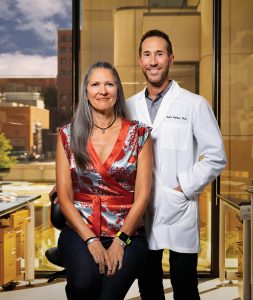
May
Dr. Scott Plafker likes medical solutions that don’t come in pill bottles.
In his OMRF lab, he’s studied how a compound naturally produced in broccoli, cabbage, cauliflower and Brussels sprouts can protect eyes as they age. “Because it’s readily available in vegetables, people can get it with ease, and they can get it without prescriptions or high costs,” he says. “That’s the best kind of treatment.”
Now, with a four-year grant he received in May, he’ll continue his search for dietary solutions to medical problems. Once again, he’s focused on the eyes. But this time, he’s looking at optic neuritis, blindness that accompanies disease flares in multiple sclerosis; vision loss is initially temporary, but repeated flares can cause permanent blindness.
In a previous study, Plafker examined the effects of a drug on optic neuritis. While only two of the 52 patients who stayed on the medication experienced an MS flare while taking it, more than 200 patients in the study quit taking the drug, either due to unwanted side effects or a perception the drug wasn’t working. “That’s a big reason we believe dietary interventions may be a more promising and easier-to-tolerate approach to treating autoimmune disorders,” he says.

For this study, he’ll test how a low-carbohydrate, high-fat ketogenic diet affects optic neuritis in mice genetically engineered to have an MS-like condition. In previous mouse experiments, a keto diet eliminated optic neuritis along with the movement-related symptoms of MS. “One goal of this grant is to figure out how the diet produces the desired results,” says Plafker.
As with all of his projects, a key component on this one will be his wife and collaborator, Kendra, who has served as his laboratory manager since the two joined OMRF’s scientific staff in 2011. He sets the overall direction of the research while she manages the lab’s day-to-day operations and oversees their team’s experiments. “The goal is to have somewhat defined roles that complement one another so we can be as efficient as possible,” Kendra says.
While they may play different parts in the process, Scott says the pair share a common goal: “We want to embolden people to actively participate in their own health. Diet is a powerful way to do that.”



